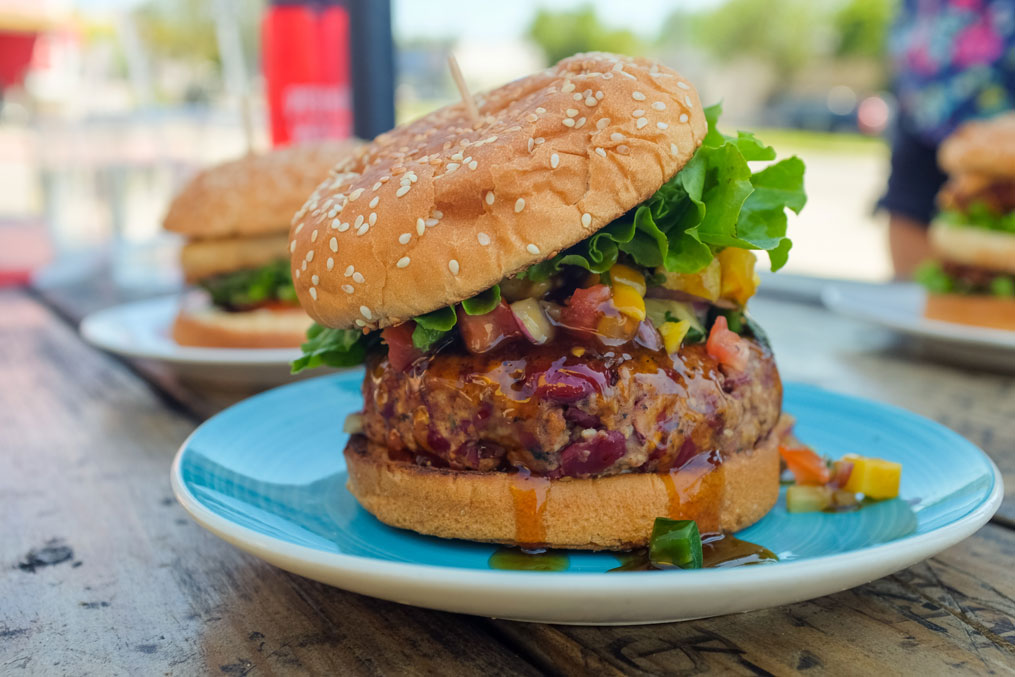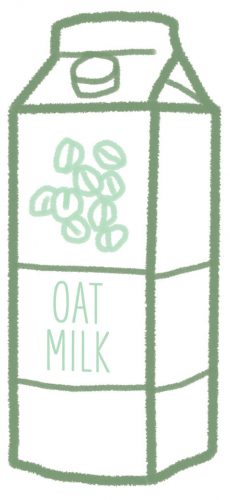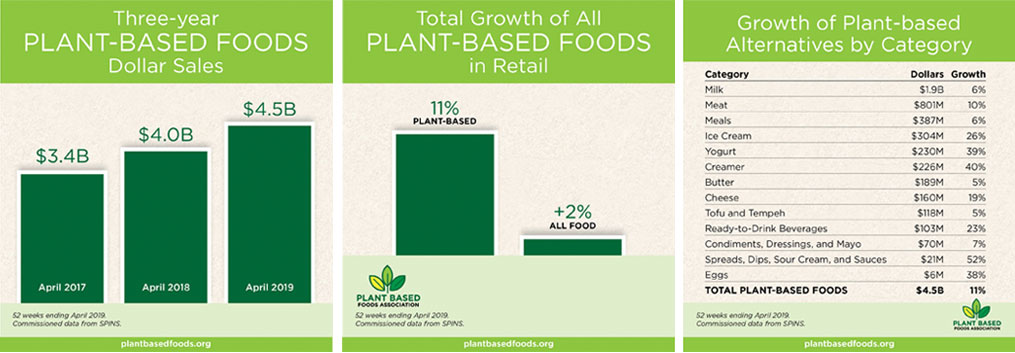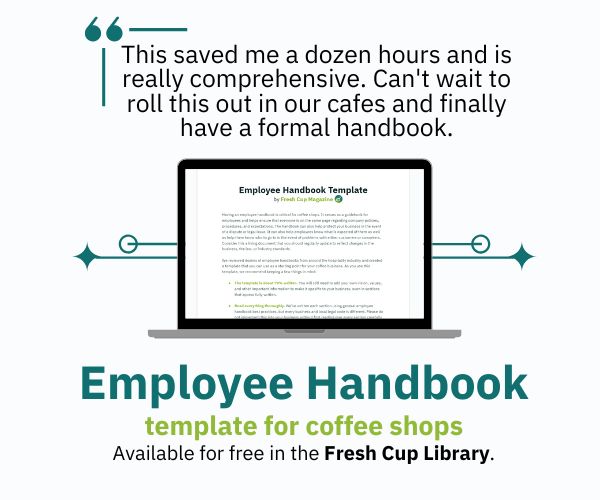Super bites at Real Roots Cafe.
[I]n the last year alone, Fresh Cup has covered topics including alternative dairy-free milks, CBD, collagen, adaptogens, and more, each article focused on telling you the Next Big Thing that will appeal to the ever-increasing health-conscious consumer base and help grow your bottom line.
Fresh Cup isn’t a health and wellness magazine—nor does it support the notion of a one-size-fits-all methodology of catering to these of-the-moment trends. But some things are hard to ignore. While the past few years have indeed seen a wealth of innovative flavors, vegan-friendly ingredients, and add-ins with purported health benefits, a pattern has emerged through the noise of “better-for-you” trends and products.
From the monumental rise of oat milk to the increasing popularity of Meatless Mondays, today’s consumers aren’t simply looking to make healthier decisions—they’re trying to help the planet.
A Plant-Based Renaissance
Becky Reeves recalls when the only vegetarian options at cafés and restaurants were a simple house salad.
“Now,” she says, “we are seeing Impossible Burgers at Burger King, Beyond Meat at Dunkin’ Donuts, and a general understanding that meat/dairy substitutes need to be a part of any menu.”

Even major foodservice companies have hopped on board. Within days of each other, Sodexo announced the debut of the Impossible Burger at more than 1,500 U.S. locations in August, while Aramark announced a partnership with Beyond Meat.
“Consumer preferences were driving a need for quality plant-forward offerings and our culinary team has been working with a broad range of plant-based products to create more enticing menu choices,” Heidi Hogan, Aramark’s vice president of product development, said in a statement.
Following the popularity of the impressively meat-like yet meat-free products, scientists around the country have been experimenting with biotechnology to create lab-made dairy products. Motif Ingredients, Perfect Day, and New Culture are just a few of such companies producing animal-free milk, cheese, and yogurt.
Meanwhile, new findings by the World Research Institute estimate the global population will grow to a projected 9.8 billion in 2050, causing overall food demand to increase by more than 50% and demand for animal-based food by nearly 70%. Livestock, including cattle, sheep, and goats, currently use two-thirds of global agricultural land and contribute roughly half of agriculture’s production-related emissions.
“If today’s levels of production efficiency were to remain constant through 2050, then feeding the planet would entail clearing most of the world’s remaining forests, wiping out thousands more species, and releasing enough [greenhouse gas] emissions to exceed the 1.5°C and 2°C warming targets enshrined in the Paris Agreement—even if emissions from all other human activities were entirely eliminated,” the World Research Institute states in the report.
The realities of the effects of climate change have led many concerned citizens—most notably millennials and Gen Zers—to start rethinking their food consumption habits, leading to what Reeves calls a “plant-based renaissance where oat milk is kind of the Beverage General of it.”

“I think it is fair to say that the rise of oat milk definitely coincides with a general rise in plant-based options,” she says. “With more information available to us, especially as it pertains to the environment, our generation is saying enough is enough. We want a planet for our children and grandchildren…. Supporting a structure that allows meat and dairy to be factory farmed to become unrecognizable to the basic agricultural system, and on top of that creating so much methane pollution, this tired and damaging system just isn’t going to cut it anymore. Consumers are demanding change, transparency, and sustainability beyond buzzword but of action.”
Taking Root
One business taking such action is Real Roots Cafe, which opened in September 2017 in Fort Oglethorpe, Georgia, nine miles south of Chattanooga, Tennessee. After three years working and learning in plant-based kitchens in the Chattanooga area, Matthew and Tiffany Lake decided to open their own business, with a mission to offer delicious, plant-based, whole food.
“We also understand our impact as humans and want to provide amazing dishes that lessen our impact on animals and the planet,” says Matthew Lake.
Since opening, Real Roots has developed a real following in its community, with devotees and initial skeptics of the plant-based movement alike becoming regular patrons. Some of the most popular items on the fully vegan menu include jackfruit nachos and tacos, avocado toast with house-made “parmesan,” and key lime “cheezecake,” alongside their beverages made with local Mad Priest Coffee, such as their Ginger Snap Latte, Choco Latte, and cold brew.
Lake credits not only medical studies about the benefits of a plant-based diet, but also the wave of celebrities and athletes who have adopted one, that have helped the trend gain momentum over the last few years. He believes the popularity of plant-based offerings will only continue as more consumers are introduced to them through the aforementioned mainstream food channels and become more educated on the matter.
“It will also continue as this is a lifestyle change instead of a ‘diet,’ and really lifestyle changes have a much higher long-term success rate,” he says.
A Tipping Point
Following suit with fast-food and chain restaurants, Lake believes that every option on a menu will be able to be veganized down the line. Cafés in particular will need to offer plant-based options, specifically dairy-free milk options—“or get left in the dust” if they don’t, he says.
New research supports this. In July, the Plant Based Foods Association and The Good Food Institute released data showing that U.S. retail sales of plant-based foods have grown 11% in the past year, bringing the total plant-based market value to $4.5 billion.
“Plant-based foods are a growth engine, significantly outpacing overall grocery sales,” said PBFA senior director of retail partnerships, Julie Emmett, in a statement. “We are now at the tipping point with the rapid expansion of plant-based foods across the entire store, so it is critical for retailers to continue to respond to this demand by offering more variety and maximizing shelf space to further grow total store sales.”
Retailers, restaurants, and café owners must begin adopting practices to cater to the growing demand of consumers seeking plant-based options. Whether it’s offering an array of non-dairy milks and creamers, adding one or two plant-based options, or consulting with vegan chefs to craft an enticing new menu, today’s café owners have more channels than ever to signal that they understand their customers’ lifestyle needs and honor their patronage.
However, Lake cautions that soon it won’t be enough to simply update one’s menu and call it a day. He believes traceability and transparency will be even more key to being a successful business.
“Integrity is also an important part of the customer-to-business connection, and many cafés have taken it upon themselves to show where beans are sourced and how they are washed/roasted,” he says. “Many people are now demanding the same ‘walk-through’ with their food, showing source and farming practices…Look for this to be a normalized practice (boards showing farms where produce is sourced and certain certifications the farm may hold).”
Beyond this, leaders in the industry are also calling for more accessibility as we continue to move toward a plant-based future.
“Who are we granting access to sustainable choices? Those that can afford it? Who are we welcoming into cafés? People who look like us?” says Reeves. “I hope we continue to incorporate the conversation of access when it comes to sustainability. From farmers around the world, to the staff behind a bar, to the products cafés choose to buy, what systematic changes need to be met to make sure we aren’t leaving people behind?”
Throughout history, societal movements have left behind the disenfranchised. But Reeves is hoping that by including more voices and more ideas, the plant-based movement can ensure growth in a way that reflects everyone.
“After all,” she says, “everyone deserves a sustainable and resource-filled planet, not just the folks who can afford the oat milk upcharge.”


















